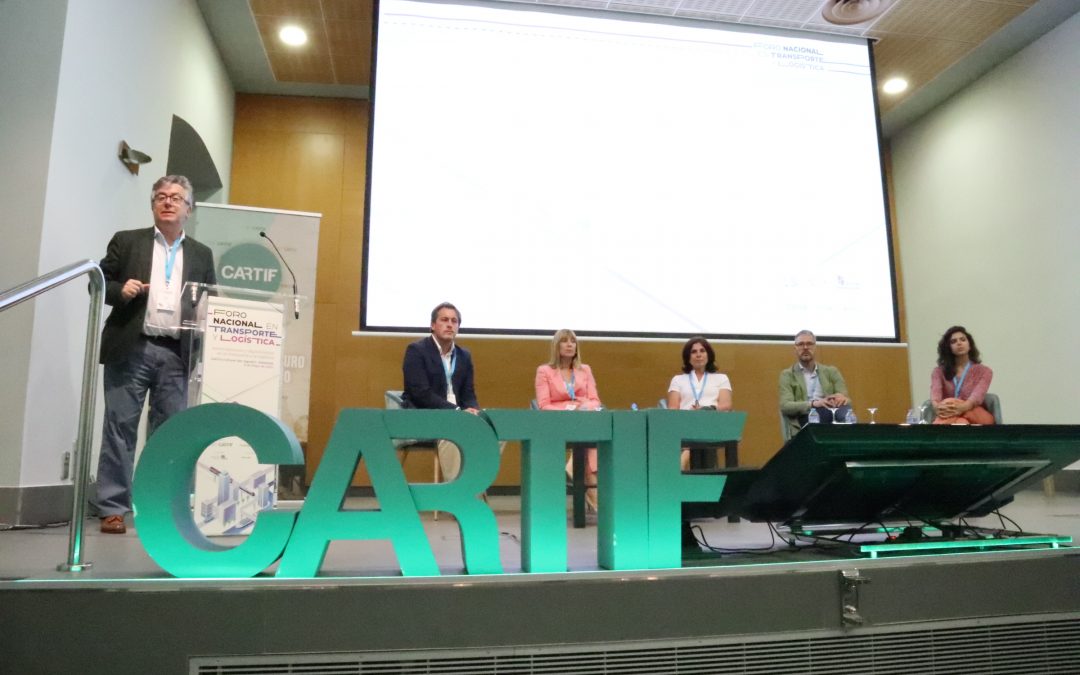A hundred experts in the field from different parts of the country and competent innovative entities attended this conference in which the opportunities of the logistics and transport sector were shared from a more sustainable and digitised perspective.
The National Forum on Transport and Logistics: automation and digitalisation in transport and logistics, organised by CARTIF and with Logistop as a strategic partner, took place in Valladolid on Wednesday 9 May. The meeting brought together a hundred experts in the field from different parts of the country and competent innovative entities that presented throughout the day the opportunities of the transport and logistics sector from a more sustainable perspective, with the aim of discussing the path towards a digital organisation, showing the latest trends and analysing the challenges of the digital society.
The forum was inaugurated by María González Corral, Minister of Mobility and Digital Transformation of the Regional Government of Castilla y León, who stressed the importance of joining and sharing efforts to address the challenges we face, adding that “traditional logistics is not valid in this new era. We are facing a new, different and demanding customer”.
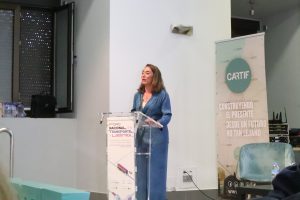
For his part, José Ramón Perán, the CEO of CARTIF, highlighted the importance of applying innovation and research to this sector, as well as CARTIF’s capabilities and lines of research in this field.
Tomás de la Vega, Managing Director of Logistop, highlighted the importance of the collaboration and consensus of the whole sector to carry out the necessary change that will allow us to face the existing challenges given that we are facing a situation in which “the world is remaking itself every second, despite the recession, inflation and price increases”.
The panel of speakers, organised in three specialised blocks, tackled transport and logistics from a practical and sustainable point of view, including their future plans through connectivity or Artificial Intelligence, and even talked about intermodality and corridors.
Urban mobility and sustainable logistics
In the first block, Urban mobility and sustainable logistics, moderated by Tomás de la Vega, initiatives and benchmark projects in this field were analysed by leading experts and pioneers who showed the latest trends and advances that are already taking place in the field of innovation.
To begin with, Irene Martín García, director of business development at Opinno Spain, stressed the importance of companies having to be able to integrate the exponential changes that are taking place in today’s world and adapt business and management models, as well as being able to innovate constantly.
In his presentation, he detailed the main characteristics that an innovative company must have: 1) be connected to the ecosystem; 2) be customer-focused; 3) be agile; and 4) have a company culture that fosters innovation.
Next, Daniel Latorre Recio, Deputy General Manager of CITYlogin Iberia and Head of Innovation of Urban Logistics at Logistop, pointed out that “in the face of uncertainty, we have no choice but to innovate”. And, in this sense, he presented several projects in which CITYlogin Iberia is participating, with special emphasis on how to change processes and innovate collaboratively.
Alicia Fariñas, General Manager at Malena Engineering, presented the eMilles project, a new concept of urban vehicle that arises from the premise that Malena understands that “the new generations do not conceive of a vehicle that pollutes, nor a city centre through which cars pass”.
For her part, Isabel Sánchez Serrano, managing director and director of corporate social responsibility at Grupo Disfrimur, pointed out that given the lack of knowledge about the fuel of the future, the client will have to choose how they want their goods to arrive and Disfrimur will help them to select the logistics that best suits their needs. All this taking into account the multiple variables that affect: route, client, cost… With reference to cost, Isabel indicated that “innovating and being sustainable costs, but you have to be there first. Without a doubt, being sustainable nowadays is a point in your favour when it comes to being chosen as a transport company over others”.
To end this first block, Óscar Pernia, co-founder and Head of Technology & Innovation, NextPort.AI, highlighted, among other aspects necessary to improve the connection of ports to the logistics network through digitalisation, the role of digital transformation as a catalyst towards efficient, sustainable and resilient operations.
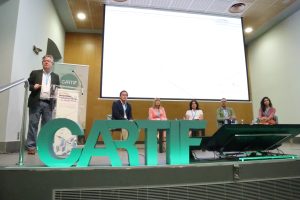
Future in transport and logistics
Javier Olmos, head of business programmes at the CARTIF Foundation, moderated the second block Future in transport and logistics: connectivity, AI, automation and new digital technologies, highlighting the importance of innovative solutions to try to give sustainability to the sector.
This block included the participation of Cándido Macías Macías, IT & Innovation Director in Iberia of FM Logistic (who, together with Javier Olmos, explained the CleanPorts 5.0 Project, which arose within the framework of Logistop, and its implementation through automations and AI from the port to the last mile); Andrés Hernando, CEO of Hiperbaric (who explained to those present the high-pressure hydrogen compression technology for mobility); Miguel A. Alonso Juliá, Director of Engineering at ALSA Group (who analysed the experiences of the autonomous bus in Madrid); Vicente Milanes, Innovation Project Manager at Renault Group (who detailed new driving assistance systems and connected services that are being implemented at Renault Group); and Jon Asin, CEO of BeePlanet (who spoke about sustainable innovations in electric truck charging).
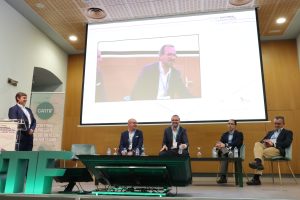
Transport and Sustainability: intermodality and corridors
To end the day, the Transport and Sustainability: intermodality and corridors block was moderated by Arturo Pérez de Lucía, Managing Director of AEDIVE.
In this block, the development of European Corridors in the new context of multimodality was analysed by José Antonio Sebastián, Commissioner for the Atlantic Corridor, Ministry of Transport, Mobility and Urban Agenda; the electrification of corridors and the massive deployment of recharging infrastructure through the analysis of Jesús López Martínez, head of Urban Mobility – eBus & eTruck – of Iberdrola; the importance of the promotion of hydrogen through the presentation of the Castilla y León Hydrogen Association (H2CYL) by its manager Javier Robador Fuste; the role of logistics centres as a tool for the development and structuring of the territory by Fernando Pérez Aguado, president of CYLOG; and finally, the importance of digitalisation in the deployment of ultra-fast freight networks was analysed by David Huete Maestre, director of business development at Zunder.
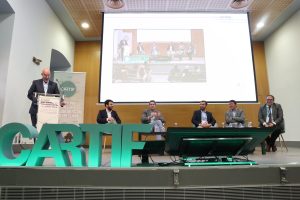
“The virtual model allows to explore the results in different scenario configurations through the applicability of different technological innovations”
David Ciprés, Head of Research Line, ITAINNOVA
Optimising port operations on the water’s edge using digitised data
Coqui García has analysed the challenge facing the port community in the transition from a traditional model, in which the agents communicate on paper one by one, to a new paradigm of data sharing in which data sharing plays a crucial role. In this new paradigm, García points out, the different agents can access reliable, digitised data that will allow them to make decisions in a collaborative way.
Likewise, among the current problems that the ports have to face, García highlighted poor coordination between partners, low transparency and visibility, as well as inefficiencies within the supply chain.
Moreover, the ports, in their strategic plans, have identified three critical areas: sustainability, security and efficiency.
To conclude his speech, García explained the different management solutions for the digitalisation of different port agents (pilots, tugboats, moorers and control tower), through the ecosystem of products developed by HIADES under the AMURA brand, which allow to identify, in real time, what is happening at any given moment.
“Real-time information and predictions allow ports to actively improve the entire logistics chain”
Coqui García, PhD, Chief Technology Innovation Officer, HIADES Business Patterns, SL, and Associate Professor in the Dept. of Mathematics, Statistics and Operations Research at the University of La Laguna
About Logistop
At Logistop we transform the supply chain through innovation, helping industry and companies to become more efficient and sustainable.
We are a multidisciplinary and inter-territorial working space in the logistics innovation arena formed by all the actors involved in the supply chain, as well as universities, technology centres, associations and specialised consultancy firms.
One of Logistop’s main objectives is: 1) To promote the need for innovation among companies involved in the logistics sector; 2) To promote innovation projects; 3) To communicate the real needs of the sector at an institutional level.

